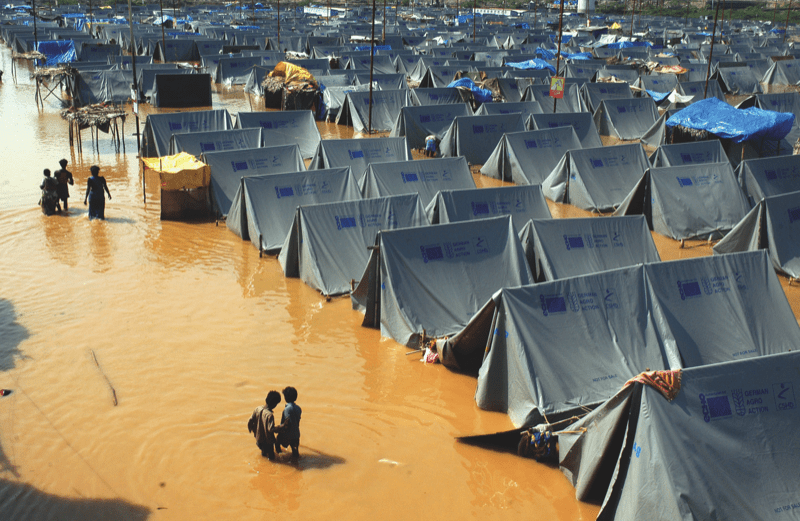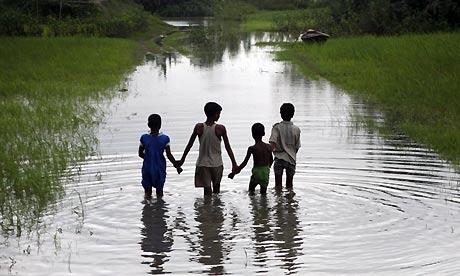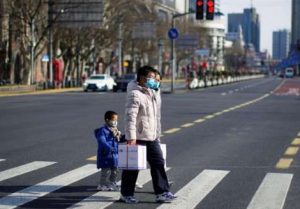
Confronting the most significant environmental alteration in human memory demands two responses: adaptation (adjusting to the risks and consequences) and mitigation (how we lessen and reduce what causes climate change). In report after report by the eminent Intergovernmental Panel on Climate Change, we read that the trend is already intensifying weather patterns typical of the Asia-Pacific region, such as typhoons, floods, and monsoons. Risk analysis firm Maplecroft rated sixteen countries as “extreme risk”, with a frightful six in Asia alone: Bangladesh, India, Nepal, Afghanistan, the Philippines, and Myanmar.
These countries are mired in poverty or rapidly industrializing (in the case of India, both), and lack the finances and infrastructure for dealing with extreme weather, mass displacement, and continental migration. The prospects for Bangladesh are particularly grim, despite it having contributed only 0.3 percent of emissions. According to Dr. Atiq Rahman, the country’s most prominent climate change specialist, rising waters will flood about 17 percent of land and displace around 18 million people by 2050. The outrage in Bangladesh and many developing countries, which have contributed relatively little to the global carbon footprint but are at the highest risk of the consequences, is all too understandable.
In a dark twist to the story of climate change, five of these six extreme-risk countries share in a significant portion of the Buddhist heritage. India and Nepal both lay claim to being land that the Buddha’s feet touched, while Bangladesh and Myanmar have significant Buddhist populations. As a heartland of Gandhara and early Mahayana Buddhism, Afghanistan remains a repository of Buddhism’s presence along the Silk Road and Central Asia. The already-unfolding crisis in weather patterns will devastate the already impoverished citizens of these five countries that Buddhism calls home. It will also threaten to destroy the many Buddhist landmarks and archeological sites that dot these nations’ landscapes.
Climate change continues to be too abstract a concept for most (even Buddhists) in developed countries to empathize with. But now we know that, left unconstrained, its effects will ravage significant, irreplaceable parts of the Buddhist world. When framed this way, climate change becomes a much more visceral threat to our global Buddhist community. The devastation awaiting (and already occurring in) countries as diverse as Bangladesh and Afghanistan should be a moral and spiritual spur for Buddhists to take action. United action begins with a renewed exploration of what it means to commit to Right Action and Right Livelihood, the critical dimensions that will either contribute to or alleviate climate change.
Buddhism, of course, looks beyond artificial boundaries and embraces all sentient beings in its scope of care. Once Buddhists are united in urgent concern for the Asian countries facing devastating climate change, the global sangha needs to build alliances with the other great spiritual traditions (be they Dharmic, Abrahamic, or otherwise) to share solutions to a common threat. All authentic religions seek the preservation of life and the prospects of future generations. They all have a collective responsibility to nature and the human beings dependent on nature. The silver lining to the growing cloud of carbon dioxide is, perhaps, that healing or stopping the consequences of climate change is the common cause around which adherents of every teaching can rally.
Religion must unite with civil society to effect concerted change. Religions bring moral weight to the table, whilst the fight against climate change is best mobilized through individual citizens, charities, local communities, and global bodies. Our Voices is one example of the bridge between civil society and religion. Its strategy is to mobilize religious believers’ voices to express the need for action at the UN Climate Talks in Paris, 2015. We have heard many economic and political arguments against climate change, from world leaders and CEO’s alike. But perhaps it is a united front of priests, monks, imams, shamans, rabbis, and devotees that might prompt substantial action on a moral basis. Time is running out for adaptation and mitigation. According to some scientists, we are at the point of no return. But with our petitions and prayers, Paris 2015 may just see a change in fortunes for our one and only planet.
See more
The Four Truths of Climate Change













